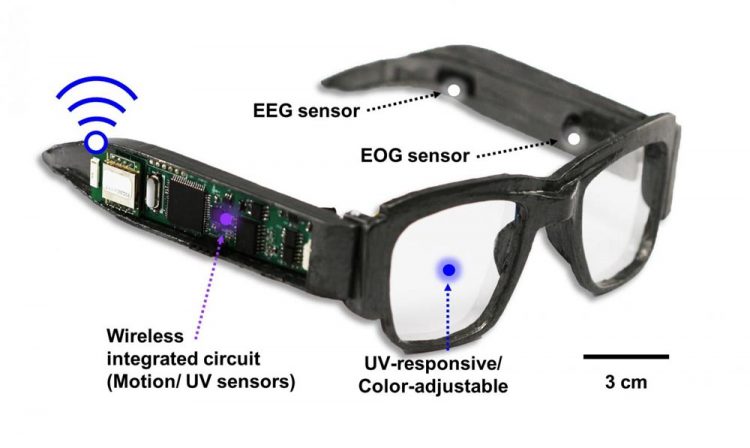Multifunctional e-glasses monitor health, protect eyes, control video game

Smart e-glasses can wirelessly monitor EEG and EOG signals, UV intensity, and body movements, while also acting as sunglasses and a human-machine interface. Credit: Adapted from ACS Applied Materials & Interfaces 2020, DOI: 10.1021/acsami.0c03110
Devices that measure electrical signals from the brain (electroencephalogram; EEG) or eyes (electrooculogram; EOG) can help diagnose conditions like epilepsy and sleep disorders, as well as control computers in human-machine interfaces. But obtaining these measurements requires a steady physical contact between skin and sensor, which is difficult with rigid devices.
Suk-Won Hwang and colleagues wanted to integrate soft, conductive electrodes into e-glasses that could wirelessly monitor EEG and EOG signals, ultraviolet (UV) intensity, and body movements or postures, while also acting as a human-machine interface.
The researchers built the glasses' frame with a 3D printer and then added flexible electrodes near the ears (EEG sensor) and eyes (EOG sensor). They also added a wireless circuit for motion/UV sensing on the side of the glasses and a UV-responsive, color-adjustable gel inside the lenses. When the sensor detected UV rays of a certain intensity, the lenses changed color and became sunglasses.
The motion detector allowed the researchers to track the posture and gait of the wearer, as well as detect when they fell. The EEG recorded alpha rhythms of the brain, which could be used to monitor health. Finally, the EOG monitor allowed the wearer to easily move bricks around in a popular video game by adjusting the direction and angle of their eyes. The e-glasses could be useful for digital healthcare or virtual reality applications, the researchers say.
###
The authors acknowledge funding from the KU-KIST Graduate School of Converging Science and Technology and the National Research Foundation of Korea.
The abstract that accompanies this paper can be viewed here.
The American Chemical Society (ACS) is a nonprofit organization chartered by the U.S. Congress. ACS' mission is to advance the broader chemistry enterprise and its practitioners for the benefit of Earth and its people. The Society is a global leader in providing access to chemistry-related information and research through its multiple research solutions, peer-reviewed journals, scientific conferences, eBooks and weekly news periodical Chemical & Engineering News. ACS journals are among the most cited, most trusted and most read within the scientific literature; however, ACS itself does not conduct chemical research. As a specialist in scientific information solutions (including SciFinder® and STN®), its CAS division powers global research, discovery and innovation. ACS' main offices are in Washington, D.C., and Columbus, Ohio.
To automatically receive news releases from the American Chemical Society, contact newsroom@acs.org.
Media Contact
All latest news from the category: Information Technology
Here you can find a summary of innovations in the fields of information and data processing and up-to-date developments on IT equipment and hardware.
This area covers topics such as IT services, IT architectures, IT management and telecommunications.
Newest articles

Sea slugs inspire highly stretchable biomedical sensor
USC Viterbi School of Engineering researcher Hangbo Zhao presents findings on highly stretchable and customizable microneedles for application in fields including neuroscience, tissue engineering, and wearable bioelectronics. The revolution in…

Twisting and binding matter waves with photons in a cavity
Precisely measuring the energy states of individual atoms has been a historical challenge for physicists due to atomic recoil. When an atom interacts with a photon, the atom “recoils” in…

Nanotubes, nanoparticles, and antibodies detect tiny amounts of fentanyl
New sensor is six orders of magnitude more sensitive than the next best thing. A research team at Pitt led by Alexander Star, a chemistry professor in the Kenneth P. Dietrich…





















